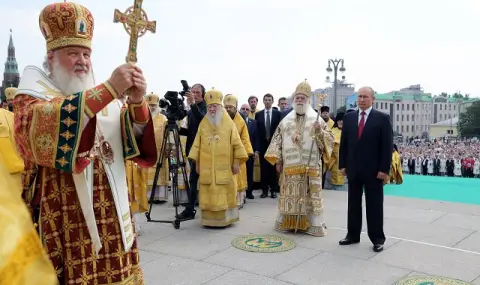This dispute has been going on for months: does Ukraine have the right to impose bans on certain religious groups linked to Russia. Why is Kiev doing this and what does Brussels say about it?
Religious organizations in Ukraine will soon be unable to cooperate with the Russian Orthodox Church (ROC). The ban is aimed primarily at the Ukrainian Orthodox Church, which is under the auspices of the Moscow Patriarchate. Until 2022, the Ukrainian Orthodox Church was subordinate to Moscow, but separated from it after the start of full-scale war. Is this just for show - this question is part of the current debate.
The draft law on the prohibition of cooperation with the Russian Orthodox Church has been creating controversy for months, including at the European level. When the law was approved, there was almost no reaction.
The European Union does not want to interfere in this matter
Is this law compatible with preserving religious freedoms? The Constitution and legislation of Ukraine guarantee freedom of religion, as implied by the European Convention on Human Rights and the Charter of Fundamental Rights of the EU. In its report from November 2023, the European Commission (EC) wrote that "in principle, Ukraine respects these rights”.
Brussels knows that Ukraine is taking legal action against the Ukrainian Orthodox Church because the Moscow Patriarchate supports Russia's war of aggression against Ukraine. In the words of Peter Stano, the EC's spokesperson on foreign affairs, Kiev's decision is "for reasons of national security and to prevent external interference by Russia.” Obviously, the European Union does not want to interfere in this matter and will not set it as a condition for Ukraine's accession negotiations, believes Theona Lavrelashvili from the Wilfrid Martens Center for European Studies. However, according to the political scientist, the situation is very complicated.
Charges and convictions
Since the start of Russia's full-scale invasion, authorities in Ukraine have already filed more than 100 charges against priests from the Ukrainian Orthodox Church under the auspices of the Moscow Patriarchate. According to the security forces of Kiev, 26 people received sentences - for treason, collaboration with Russia and complicity. The Russian Orthodox Church calls the invasion of Ukraine "holy war” and claims that the entire territory of the country "must be returned exclusively to the sphere of influence of Moscow”. That is why Kiev considers the church ideologically bound to the war and complicit in war crimes.
The Ukrainian Orthodox Church under the auspices of the Moscow Patriarchate is still Russia-centric, according to a study by the Ukrainian Bureau of Ethnopolitics and Religious Freedom. The canonical link with the Russian Orthodox Church has not been severed in any way, although the Ukrainian Orthodox Church has publicly dissociated itself from Moscow.
"Spiritual independence from Moscow"
Before introducing the law, the Ukrainian government could seek advice from, for example, the Venice Commission of the Council of Europe, which reviews legal acts for compliance with European standards. This was proposed by 46 Ukrainian MPs, but rejected by the speaker of the Ukrainian parliament. The reason is that an EC report on Ukraine specifically notes that Ukraine has taken legal action against the Ukrainian Orthodox Church, which is linked to Moscow. These include sanctions against senior church officials accused of supporting Russia's war of aggression, as well as searches of church premises.
"In the context of war, Brussels will probably not intervene. It is possible to define the current actions of Kiev as a step towards Ukraine gaining spiritual independence from Moscow”, says Lavrelashvili:
Dmytro Vovk, professor of law and religious expert at the National Law University "Yaroslav Mudry" in Kharkiv, who currently teaches in New York, also believes the law is unlikely to hinder Ukraine's European integration. Teona Lavrelashvili suggests that Brussels will demand guarantees from Kiev if Ukraine's EU accession talks continue: In that case, the government will have to guarantee that no one will be discriminated against on the basis of their religious beliefs under the new law.
